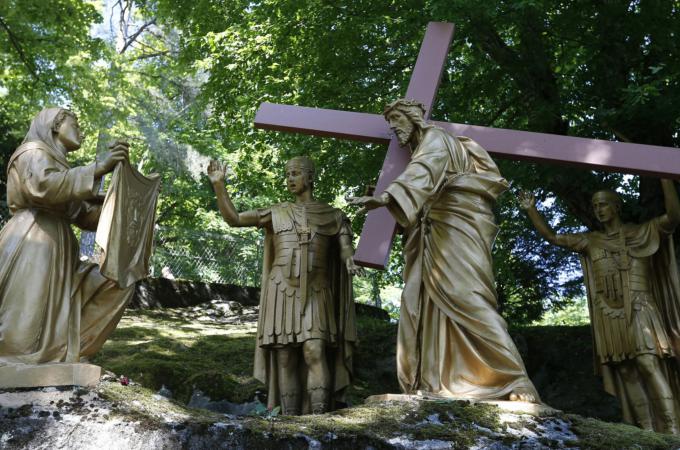A long Lent
And so Lent begins, or rather, so it continues. For that is what this seemingly endless season of penance and deprivation feels like to most of us. A global pandemic, fires, hurricanes, winter storms, economic distress, social and political division: practically no disaster has been left behind. To borrow and twist a phrase from C.S. Lewis' Narnia: It's been a whole year of always Lent and never Easter.
I remember thinking that all this quarantine business would be over in a few weeks. Refusing to cancel reservations for a May trip to Italy until well into April seems completely ridiculous now, though it didn't at the time. I think I finally stopped looking for alternative dates sometime in November, as the numbers of COVID cases were on the rise again. At least most of the platitudes about how "we're all in this together" have disappeared. And, we haven't heard talk of a "new normal" for a while now. I hope that's not because we're already living it.
And then there's the vaccine. Most of us thought that a safe and effective injection would put an end to all this. As it turns out, it may take longer to manufacture and distribute the vaccine to enough of "the herd" than it did to develop and test one. Certainly, there's light at the end of the tunnel, but the tunnel is still considerably longer than we hoped, or thought, or expected it to be. We're exhausted by what we've already been through, and nobody knows now how much more there is in front of us.
At the end of a year like this one, giving up chocolate or Facebook can seem both masochistic and meaningless. (Frankly, I'd like to give up my mask!) But it's legitimate to ask who, in the midst of unprecedented anxiety and loss, would look for yet another way to go without? A Christian, that's who. But how and why are worth further consideration.
None of us chose to make the sacrifices that have been foisted upon us over the past year. My guess is that probably no one would. That doesn't necessarily mean that everything we've suffered doesn't count, but it also doesn't change the fact that it takes a kind of inner transformation to turn a loss into a sacrifice. Acceptance is what fuels that transformation. We can't carry our crosses or unite our sufferings with Christ's if we do not accept them.
I can't say that I've made very good use of what 2020, and now 2021, has required of me; maybe you have. While I've done my best to maintain a cooperative spirit, to stay positive and encouraging and hopeful through it all, I haven't managed to offer very much of it up or turn my comparably small losses into anything of value. That's mostly because I haven't embraced them enough to make them sacrifices, because while I am ready to accept God's providence and blessing, I'm not necessarily ready to accept his will. The problem is I have my own strong and stubborn will, and I've spent a lifetime exercising it. I know I can't win a contest of wills against God, but for some reason, I still try. And he lets me -- until I decide to stop wrestling and start listening. Until I learn the difference between giving up and giving it up into his hands.
The mainstream of our contemporary American culture is largely epicurean. That is, we generally equate all suffering with evil and all pleasure with good. This is not what Christians believe, even though it is how many of us live. And that is why we have Lent. Lent can help us to recalibrate, even in times like these, perhaps especially in times like these. That's because Lenten disciplines like fasting, abstinence, and almsgiving remind us that it is not only "bad things" that separate us from God. Good things keep us from God when we value them more than the supreme good that is God himself. After all, Lent is not primarily about giving up our sins and vices. We're always called to do that. It's about surrendering the things we hold onto in place of God, the good things we tell ourselves we are entitled to, have earned, or otherwise deserve.
This year, my prayer is that God will help me to accept my losses as readily as I accept his blessings and show me how to turn each one into a sacrifice that can be united with his redemptive suffering. After all, that's what it means to take up our crosses daily and follow Jesus. I suspect we all needed far more than 40 days to learn that. It's 365 and more. But who's counting?
- Jaymie Stuart Wolfe is a Catholic convert, wife, and mother of eight. Inspired by the spirituality of St. Francis de Sales, she is an author, speaker, and musician, and serves as a senior editor at Ave Maria Press. Find Jaymie on Facebook or follow her on Twitter @YouFeedThem.



















